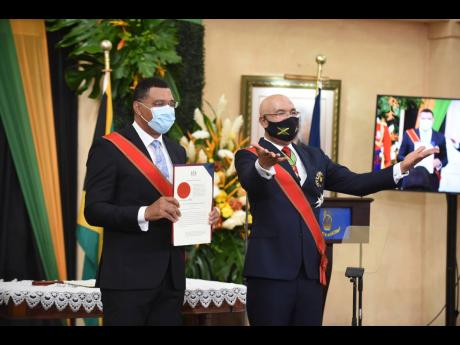Coach Holness - PM pledges to delegate more power to ministers; promises 150,000 jobs
Prime Minister Andrew Holness used his post-inauguration speech on Monday to signal a shift in how he would manage his emerging Cabinet, suggesting he would devolve more power and authority to his ministers while demanding accountability.
Holness, who was being sworn in at King’s House for the third time in nine years, also emphasised that he would not tolerate missteps and the flouting of good governance on the premise of circumventing bureaucracy.
He appointed Dr Horace Chang as deputy prime minister – the first time since the Golding administration that anyone had been elevated to the position.
Holness had been criticised in his last term in office for not demonstrating that he sufficiently trusted his ministers, keeping a watchful eye on veterans and micromanaging those he had stacked into the superministry that had oversight of economic growth and job creation while maintaining de facto responsibility for the portfolio.
In addition to holding the portfolios of defence and economic growth and job creation, Holness had assumed responsibility for energy, science, technology, education, youth, and information.
“Part of my job will be to do a constant assessment and evaluation of the team. I will have to play more the role now of coach rather than player to make sure that any strategic gaps, any tactical shortcomings, that those are immediately corrected and that when we are taking the long view, we are actually looking in the right direction,” Holness said after four key ministers of government were sworn in at King’s House on Monday.
The appointments of Senator Kamina Johnson Smith (foreign affairs and foreign trade), Dr Nigel Clarke (finance and the public service), Dr Christopher Tufton (health) and Chang (national security) represent the core of Holness’ inner circle that are expected to lead the country’s recovery out of the clutches of the coronavirus pandemic, which has drained the Budget and caused the economy to sputter.
Earlier, the prime minister warned that every member of the Government must understand that the 33-seat majority won by his Jamaica Labour Party in last Thursday’s general election was not a mandate for arrogance.
“No princes or princesses were elected,” Holness charged during his inaugural speech as he officially commenced his new administration.
Holness told a gathering of less than 50 people at King’s House that the priority will be managing the disease outbreak while keeping the economy afloat with the coronavirus now in the community transmission phase.
“The task ahead of us has to be carefully managed. It is not one where we can, without strategic deployment of our resources, achieve the goals and objectives that we want,” Holness said on Monday.
Johnson Smith told journalists that the task of highest priority was to convene a meeting of the External Support Coordination Committee – an inter-ministerial mechanism.
“We need to sit back at the table, assess where we are, assess what the new needs are in this new phase to see how best that [COVID-19 recovery] can be supported,” Johnson Smith told journalists after the ceremony.
Similar sentiments were expressed by the finance minister.
Holness announced plans by his administration to create 150,000 jobs and to pump $14 billion in support of business, tourism interests, and farmers over the next three years.
The prime minister announced that the funding provisions will include $10 billion in loan guarantees to support micro, small and medium-sized enterprises (MSMEs), $3 billion in agri-care support for farmers and fisherfolk, $1.2 billion in grants to small and medium-sized tourism operators, to be deployed through the EXIM Bank, and $500 million in grants for micro and small community-based businesses.
“We will build and strengthen the institutions that safeguard the sustainability of government finances, low and stable inflation, foreign exchange reserve adequacy, and financial sector stability,” the prime minister said.

